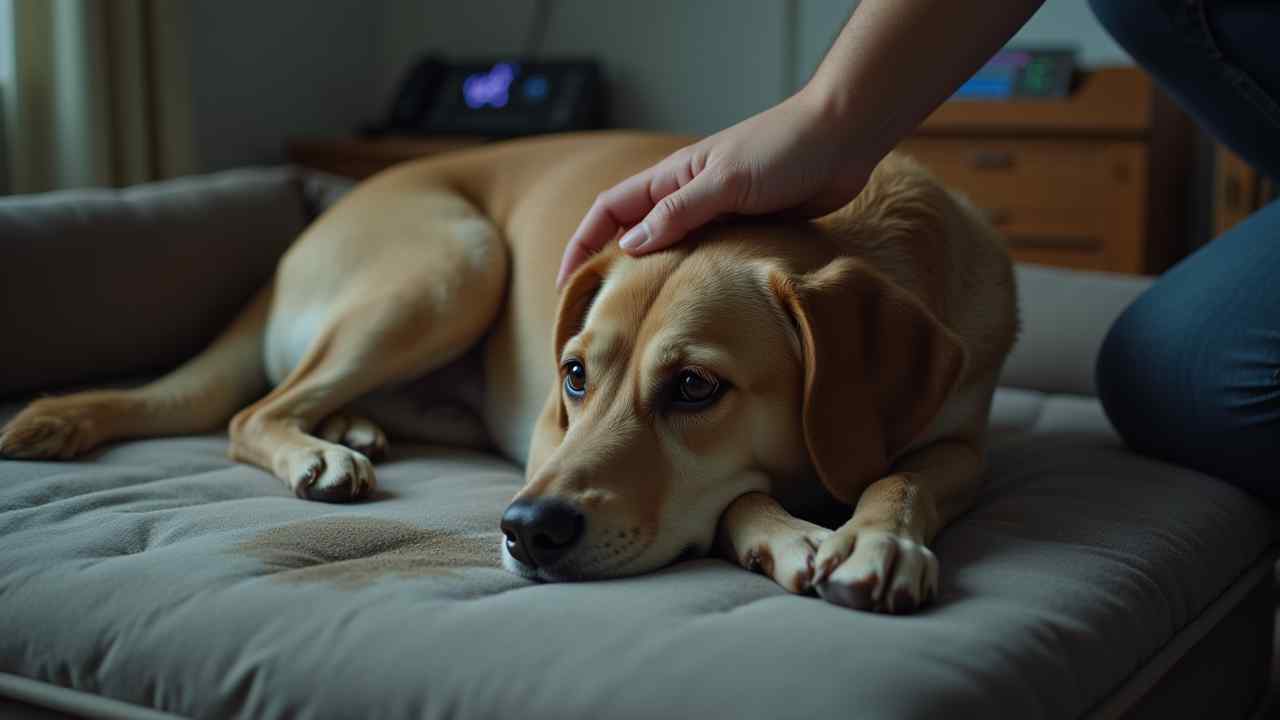
🩺 Why Is Your Dog Peeing in Their Sleep? (A Vet's Guide)
🩺 Why is Your Dog Peeing in Their Sleep? (A Vet's Guide to Incontinence) 🩺
❗ CRITICAL VETERINARY ADVICE: If your dog is peeing while they are asleep, it is a sign of a medical issue called urinary incontinence. This is not a behavioral or training problem. You must make an appointment with your veterinarian for a proper diagnosis and treatment.
Finding a wet spot where your dog was sleeping can be distressing. It is important to understand that your dog is not doing this on purpose. A dog peeing in their sleep is an involuntary act. They are completely unaware that it is happening.
This guide will explain the common medical causes for this issue. We will also cover what to expect at the vet. The most important takeaway is that this requires professional medical attention. Let's explore this common health concern. ⚠️
🤔 What Are the Most Common Medical Causes?
Urinary incontinence is the involuntary leakage of urine. When a dog is peeing in their sleep, it is almost always due to an underlying medical condition. Your vet will perform an exam to find the cause. Here are some of the most common reasons.
Is it Hormone-Responsive Incontinence?
This is the most common cause, especially in spayed female dogs. The hormone estrogen helps to maintain the strength of the urethral sphincter. This is the muscle that holds urine in the bladder. After spaying, the lack of estrogen can cause this muscle to weaken. This leads to leakage, often when the dog is relaxed or asleep.
Could it be a Urinary Tract Infection (UTI)?
A UTI is another very common cause. The infection irritates the bladder. This can cause an urgent need to urinate and a lack of control. Other signs of a UTI include straining to urinate or having accidents while awake.
What about other issues?
Other potential causes include bladder stones, which can cause irritation. Spinal cord issues or nerve damage can also affect bladder control. In senior dogs, the sphincter muscle can simply weaken with age. Conditions that cause excessive thirst, like diabetes or kidney disease, can also contribute to leakage.
Is This a Behavioral Problem?
Almost never. It is very important to understand that a dog leaking urine in their sleep is not a house-training accident. It is not an act of spite or rebellion. Your dog is asleep and does not know it is happening. You should never, ever punish your dog for this.
Punishing your dog will only cause fear and anxiety. It will not solve the problem because the problem is a medical one. A compassionate and supportive approach is essential while you seek veterinary help.
✅ What Should You Do First?
The first and only step you should take is to call your veterinarian and make an appointment. This is not a "wait and see" situation. A proper diagnosis is the key to helping your dog. This is how to correctly handle a dog peeing in their sleep.
Your vet will likely perform a physical exam. They will also ask for a urine sample to perform a urinalysis. This will help them check for signs of infection, crystals, or other abnormalities. Based on the results, they may also recommend blood work or an ultrasound.
The good news is that most causes of urinary incontinence are highly treatable. For a UTI, a course of antibiotics will solve the problem. For hormone-responsive incontinence, a simple and inexpensive daily medication is often incredibly effective. The key is getting the right diagnosis.
- How Can You Manage the Situation at Home?
While you are waiting for your vet appointment and for treatment to work, you can take steps to manage the mess. Use a waterproof cover on your dog's bed. Doggy diapers can also be a very helpful tool, especially at night. It is also important to gently clean your dog's skin to prevent urine scald or irritation. 🐾